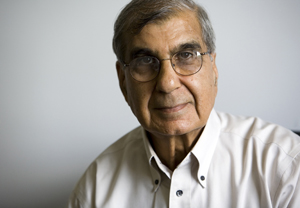A new study saying the appetite-suppressing hormone leptin is just as effective as insulin at controlling diabetes in mice is grounded in the work of Satya Kalra, Ph.D., a neuroscientist with UF’s McKnight Brain Institute who pioneered early gene therapy work with leptin.

Recently, Kalra and colleagues discovered that leptin could also combat type 2 diabetes — a disease that has become a growing problem in the United States as more Americans pack on extra pounds.
Using a novel gene therapy technique, McKnight Brain Institute researchers were able to reverse type 2 diabetes in mice. The researchers found that in diabetic mice, leptin acts in the hypothalamus to keep the body from producing too much insulin even after constant exposure to a high-fat diet, which over time can lead to or worsen type 2 diabetes. The results were published in Peptides in 2006.
“We found that we were successful in keeping the blood levels of insulin low at the same time keeping blood glucose levels at a normal range,” Kalra said. “In other words, we were able to correct diabetes in these animals under various challenges.”
In addition, Kalra reported in Peptides in 2008 that similar leptin gene therapy in a rodent model of type 1 diabetes that lack insulin, as found in human patients, also reverses type 1 diabetes.
“We showed that this reversal is brought about by stimulation of glucose metabolism and disposal by leptin action in the hypothalamus, which acts very much like insulin, even in the absence of endogenous insulin,” Kalra said. “Thus, leptin is a reliable insulin substitute for type 1 and 2 diabetes.”
Now, diabetes researcher Roger Unger of the University of Texas Southwestern Medical Center at Dallas has confirmed the efficacy of leptin in reversing type1 diabetes in research finding published in the Proceedings of the National Academy of Sciences.
Unger and his team implanted a pump near their shoulder blades of 15 diabetic mice that delivered high levels of leptin for 12 days. They compared those animals with ones treated only with insulin pumps. Glucose levels returned to normal in both groups.
Kalra commented on the UT findings in a recent article in Science, the online magazine of the American Association for the Advancement of Science.
“It’s substitute insulin,” Kalra told Science. “In type 1 diabetes, if you have a lot more leptin, it should help.”

